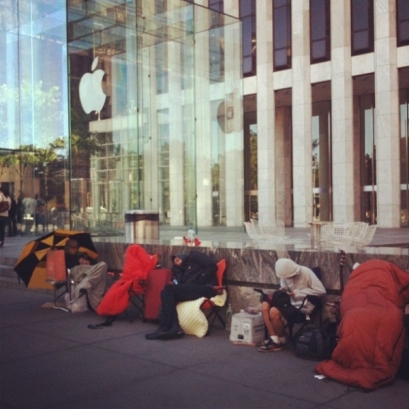The younger generations will be more familiar with the housing bubble than with the dot-com bubble of early 2000’s (tech bubble 1.0).
Let us begin with a definition of a tech bubble before going in-depth with the topic.
“A tech bubble is the rapid inflation in the valuation of public and private technology companies that exceeds their fundamental value by a large margin. It is accompanied by the rationalisation of the new pricing, and then followed by a spectacular crash in value.” Steve Blank – Consulting Associate Professor at Stanford University
We are in the longest economic downturn since the great depression. In the past couple of weeks, Apple and their new iPhone 5 sold 5 million units in the first three days, selling faster than 4 and 4S model. How are they able to achieve this, whilst central banks around the world struggle with rising unemployment rates and debt levels. Apple is not the only one in the spot light this year, Facebook’s initial public offering was able to raise $16 billion, which is 8 times more than what Google raised in 2004; what makes it impressive is how they were able to raise this amount in the midst of economic uncertainty. Facebook went on to become the third largest IPO in history and the largest technology IPO.
The technology industry is the best performing industry for the past three months and valuation of both public and private companies has a higher margin than other industries’ average. Because of the high valuation, companies have recently been looking for valuation and going public, there have been some high-profile listings with lots of media attention such as Groupon, Linked-in and Zynga.
For smaller private companies, venture capitalists and other already established companies are now providing liquidity to entrepreneurs for their companies; a recent example would be the $1 billion purchase of Instagram by Facebook Inc.. Because of these inflation in valuation, it has led some entrepreneurs to come into the industry, create a company quickly with some value and seek for a high valuations to cash in on. This is known as flipping, which will cause some concern to investors as this contribute to the build up of a bubble.
Are we beginning to see the same symptoms of the 2001 dot-com bubble? No, the difference is that previously the smaller companies were not provided liquidity until they went public. Also in 2001 the stock price was grossly overvalued, purely built on expectation rather than grounded metrics and since then IPOs have tougher listing rules, without creditable metrics, real growth and profit it is unlikely they will be able to float on the exchange. What is happening now is nothing like the insanity that gripped the market in 1999, where they had 290 internet-related IPOs , much more than we have today. In 1999 internet related IPOs accounted of 60% of the IPO deals and the average tech stock doubled on the first trading day, today we are nowhere near these percentages.
Google and Apple are not significantly overvalued and have the ability to generate profit and growth rates to support their stock value. As for the private technology companies and start-ups, they are valued so high is because they have a growth rate that the market has never seen before and their profit models are very interesting, being able to generate margins of 40% EBITDA so the valuation will have a premium built-in.
To understand where we are currently in the build up to the bubble, we need to understand that a bubble have four phases; stealth, awareness, mania and blow-off. In my opinion we have gone pass the stealth stage where Venture Capitalists invest in social networks, consumer and mobile applications long before institutional investors and profit from these new start-ups.
We are at the awareness stage, institutional investors and large venture capitalists have taken notice of the momentum and have brought in more capital and created an upward pressure on price. The most notable examples are Russian investment group, DTS and Goldman Sachs who invested over $700 million into Facebook before the IPO.
Are we in the Tech Bubble 2.0? I believe there is definitely some effervescence but I cannot see any signal that there is an irrational demand for tech IPOs. Facebook being the best example, regardless of the publicity and being the largest of all tech IPOs, it has provided proof for us that they have not traded above their listing price since their second day of trading and are now trading at around half of their listing price. I am bullish on the tech industry as global growth without sovereign risk is hard to find and investors will find stable and profitable growth in the industry.


